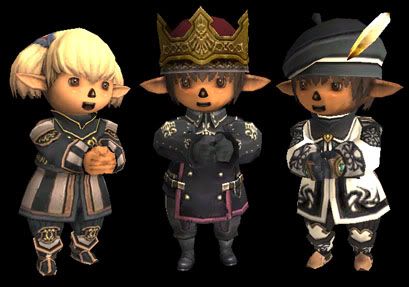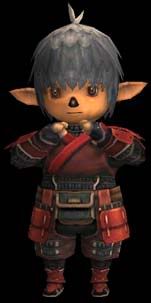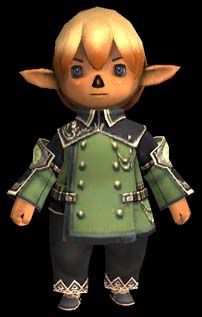Difference between revisions of "The Tarutaru Union"
(→'''Member States''') |
|||
| Line 10: | Line 10: | ||
The Tarutaru Union itself is relatively mysterious. It holds considerable influence on the Principality of [[Zionaren]] and the Protectorate of [[Trilan]]. The two states seem to have shrinking influence over their own internal affairs as the power of the Tarutaru Union seems to be growing. Since no one has ever visited the actual territory of the Union, or [[the Xheng Empire]] aside from the Tarutaru themselves, but reports of the Xheng Empire spreading its will over neighboring Tarutaru nations seems to be likely. | The Tarutaru Union itself is relatively mysterious. It holds considerable influence on the Principality of [[Zionaren]] and the Protectorate of [[Trilan]]. The two states seem to have shrinking influence over their own internal affairs as the power of the Tarutaru Union seems to be growing. Since no one has ever visited the actual territory of the Union, or [[the Xheng Empire]] aside from the Tarutaru themselves, but reports of the Xheng Empire spreading its will over neighboring Tarutaru nations seems to be likely. | ||
| + | |||
| + | The Tarutaru Union recently hosed the [[Unity Conferences]]. | ||
== '''The Five Races''' == | == '''The Five Races''' == | ||
| Line 104: | Line 106: | ||
== '''Military costs''' == | == '''Military costs''' == | ||
| − | In comparison to other militaries where they mostly employ actual living people, the Tarutaru military infrastructure is significantly cheaper since they use Cardians. Though they need to be upkept by modular equipment and engineers they are still comparitavely cheaper with the $160 billion | + | In comparison to other militaries where they mostly employ actual living people, the Tarutaru military infrastructure is significantly cheaper since they use Cardians. Though they need to be upkept by modular equipment and engineers they are still comparitavely cheaper with the $160 billion Tarut budget. |
| − | + | ||
| − | + | ||
| − | + | ||
| − | + | ||
| − | + | ||
| − | + | ||
| − | + | ||
| − | + | ||
| − | + | ||
| − | + | ||
| − | + | ||
| − | + | ||
| − | + | ||
| − | + | ||
| − | + | ||
| − | + | ||
| − | + | ||
| − | + | ||
| − | |||
There are Cardian Factories in all the cities of the Tarutaru union to assure that there is a steady ability to produce them. Only in times of security are there more produced than required, but even keeping them when not active is relatively unpractical which means that most Cardians that function in the military and civilian building programs very often. The Tarutaru are reluctant ever to go to war as this would mean unnecessary loss of live which is one of the reasons why they prefer to send in the Cardian Guards. | There are Cardian Factories in all the cities of the Tarutaru union to assure that there is a steady ability to produce them. Only in times of security are there more produced than required, but even keeping them when not active is relatively unpractical which means that most Cardians that function in the military and civilian building programs very often. The Tarutaru are reluctant ever to go to war as this would mean unnecessary loss of live which is one of the reasons why they prefer to send in the Cardian Guards. | ||
Revision as of 01:35, 6 March 2005
| The Tarutaru Union | ||||||||
|---|---|---|---|---|---|---|---|---|
|
The Tarutaru Union is a cooperative group of many Tarutaru nations throughout the world. Like their founding nations, the Principality of Zionaren, and the Xheng Empire, they work cooperatively to promote the ideas of their people and peace throughout the world. By no means do they wish to challenge the authority of the United Nations but the Union does believe that some powerful states have monopolized the power of the UN thus defeating its purpose to exist.
The Tarutaru Union itself is relatively mysterious. It holds considerable influence on the Principality of Zionaren and the Protectorate of Trilan. The two states seem to have shrinking influence over their own internal affairs as the power of the Tarutaru Union seems to be growing. Since no one has ever visited the actual territory of the Union, or the Xheng Empire aside from the Tarutaru themselves, but reports of the Xheng Empire spreading its will over neighboring Tarutaru nations seems to be likely.
The Tarutaru Union recently hosed the Unity Conferences.
Contents
The Five Races
Unknown to most of the outside world, there are actually 4 other sentient races that exist within the Tarutaru Union that are not known to the outside world. The Tarutaru themselves are the most noticed and seen of the races due to the fact that they outnumber the other races significantly. After a complex history in the Xheng Empire many refugees from the other races joined with the Principality of Zionaren and Protectorate of Trilan. For more information see The Five Races article.
Member States
</div>The Principality of Zionaren
The Protectorate of Trilan
The Protectorate of Falgan
The Protectorate of Keodian
The Protectorate of Entoran
The Principality of Li-Xheng
The Principality of Han-Xheng
The Principality of Sui-Xheng
The Principality of Tang-Xheng
The Principality of Han-Xheng
The Principality of Qin-Xheng
The Principality of Shang-Xheng
The Principality of Xia-Xheng
The Principality of Wong-Xheng
The Borderlands of Iroquoians
The Borderlands of Nunavut Nisgaa
The Borderlands of The Haida Gwaii
The Borderlands of The Denne
The Borderlands of The Kootenays
The Borderlands of The Ottawas
The Borderlands of The Mikmaq
Organization Structure

The Union Council: The Tarutaru Union's headquarters is in Xheng-An, the capital of the Xheng Empire. It also has its bureau of foreign relations in Zionaren City. Of the 16 member states all are equal and sit as equal status in the Union Council. The Union Council is headed by the Secretary-General of the Tarutaru Union who is the arbitrator of decisions and executive head of the Union Council. Under the Union Council there are also 8 Directorates with their designated Directors who function similarly to a Ministry and a Minister. These are managed by directors who are suggested by the Secretary-General and are approved by the Union Council. Each directorate has an enormous staff that oversees the deployment of the Union's declarations and objectives.
In truth the Union Council has surprising power as nothing can get done without its approval, 2/3 vote majority cast. Every member state is given 3 seats on the Council and with the current setup of 11 member states, that means 33 seats from member states alone. In addition to the 60 seats, there are 10 seats delegated to the Tarutaru Union Secretary-General, the Deputy-Secretary General and the 7 Directors. 47 votes minimum are required to pass any official legislation in the body.
The Union Council itself drafts all legislation and resolutions, where afterwards it is handed to the Tarutaru union bureaucracies for refinement and suggestive amendments. Those amendments are then presented to the Union Council itself are voted by simple 50%+1 majority vote to be kept or dismissed. Then the bill as a whole goes into private committee of selected members depending on the number of delegates who wish to participate in private debate. After it is submitted again to the Union Council as a whole to be voted on again.
Directorate of Military Affairs (DMA): The most important of all the Directorates, the DMA oversees deployments of all Union military personel and in times of war that involve any Union Member, a central command that coordinates the military actions of multiple member states. The DMA is also responsible for peacetime deployments of peacekeeping troops and coordinating the military infrastructure and transportation of resources from one region to another. All proposals of this body are made and submitted to the Union Council for its final approval.
Directorate of Trade Affairs (DTA): The Trade Affairs commission oversees the trade issues that may involve the member states. Trade disputes are often settled in this organization. Trade disputes that also involve the Union as a whole are also directed to this body. Also, the Directorate of Trade Affairs manages the money of the Tarutaru Union. The money that all member states owe to the Tarutaru union stands at 5% of their GNP. All proposals of this body are made and submitted to the Union Council for its final approval.
Directorate of Health Affairs (DHA): In events of biohazard and epidemic outbreaks the Directorate of Health Affairs is the chief coordinating body and resource manager. By the protocol and obligations of all nations involved, they must suddender health sovereignty in issues if they ask the Tarutaru Union for assistance. All proposals of this body are made and submitted to the Union Council for its final approval.
Directorate of Administrative Affairs (DAA): Bureaucracy is always inovlved in any Tarutaru organization and the Tarutaru Union is no acception. The huge bureaucracy and civil service involved in running the Tarutaru union, its directorates and its missions is vital to its survival. All proposals of this body are made and submitted to the Union Council for its final approval.
Directorate of Economic Sanctions and Fiscal Responsibilities (DESFR): The Tarutaru Union's version of a Ministry of Finance or Department of the Treasury. The most powerful directorate in the Tarutaru Union handles all the money that is contributed by member states. It is also the most heavily scrutinized as it holds the trust and financial powers of the entire Union in its hands. The DESFR is also responsible for enacting economic sanctions on foreign powers and settling internal economic troubles between members which it has done so to relatively good success. The Council of the Directorate of Economic Sanctions and Fiscal Responsibilities is headed by a 21 member board that oversees the financial decisions of the Tarutaru Union but at anytime they can be overturned by the Union Council itself.
Directorate of Diplomatic Affairs (DDA): The core negociating body of the Tarutaru Union handles external and internal disputes that are diplomatic and do not involve military intervention or trade disputes. The DDA is also chosen as the Tarutaru Union's official diplomatic channel for dealing with external diplomatic issues as well for instance foreign nations that have a conflict with a Tarutaru Union member, in which case the member state could appeal to the Tarutaru Union for full diplomatic support or could do joint-diplomatic talks. All proposals of this body are made and submitted to the Union Council for its final approval.
Directorate of Infrastructure and Transportation Affairs (DITA): Providing the infrastructure, supply cache, food and medical stores, transportation equipment and all general equipment and supplies are the duty of the DITA. In principle it is the "garage" for the entire Tarutaru Union's independent supply bases that function seperate from Nation State defense and infrastructures. All proposals of this body are made and submitted to the Union Council for its final approval.
Directorate of Humanitarian Relations and Affairs (DHRA): Deciding on peacekeeping missions and humanitarian assistance is this body's proposals and decisions. All proposals of this body are made and submitted to the Union Council for its final approval.
The Secretariat
</div>The leadership of the Tarutaru Union is headed by the Secretary-General. The current Secretary-General is Memnochus who is a moderate and a humanitarian. Over the course of his diplomatic career for the Principality of Li-Xheng in the Xheng Empire he has displayed a balanced mind for dealing with situations of intense controversy. Under him, the Secretariat has reached new levels of prestige and respect.
The Secretary-General is the head of the Tarutaru Union and thus is its highest representative to the world, region and foreign nations. The Secretary-General, if he feels that legislative bills are too unready to become law can call up to 3 additional committees to decide on the bill, however once those three committees deliver their announcements the Union Council can pass or dismiss them. This limits the Secretary-General's ability to stop a bill to mearly delaying it. The Union Council can overturn his decisions after the 3 committees are called.
The Secretary-General also is elected by the Union Council for 10 year terms. He can run consecutively as many times as he wishes, but protocol declares it highly improper to campaign for the position.
The Deputy Secretary General is simply a "Backup" Secretary-General in the event the Secretary-General is not present to vote on legislation, bills or otherwise. He must always be present in the event the Secretary-General is not there to make instant decisions.
Military power and finances
Racial Differences in the Tarutaru and Human usage of equipment is clear and evident. A Tarutaru physically is 3x smaller than a human being so military hardware is something difficult to use. To compensate for this the Tarutaru hire their own soldiers from mercenary forces or humans who wish to live in their territory. Humans who live in Tarutaru Territory who serve in the military recieve enormous benefits and compensation due to the fact that they are very well paid and respected by their shorter political leaders.
Airships: Unlike most nations in the world the Tarutaru Union Military Technology is unusual in comparison to other nations. They utilize slower moving airships, huge helium filled zepplins with reinforced rubber and titanium-aluminium skins that prevent them from being shot down. Massive propellers pull these ships forward with a fantastically large bombload that could devastate cities. Though they are considerably slower, they can fly at higher altitudes than bombers can and have remarkable accuracy. Airships are also used frequently for security checks and spying if needed
Cardian Guards: Automated soldiers designed for combat in biohazard areas or heavily mined battlefields. They are entirely automated robotic soldiers who can travel on any type of terrain even rocky terrain and obey remote controlled orders, or are left to their programming. Cardian Guards can be produced on mass and do not require food or pay. They are considerably cheaper to handle in comparison to heavy machinery. Cardian Guards can be effective with ranged weapons or even operation of tanks and armed transport vehicles. Cardians are also programmed for piloting making a single Cardian Guard a pilot, an assault trooper, a driver for a vehicle and an engineer. They do have the ability to repair each other but realistcally would need an actual Tarutaru engineer there to supervise them. Despite their appearance they can in fact go up and down staircases. They are called "Cardian" guards because they used to be named after Tarot cards. In their military ranks the "Ace" Cardians are the highest ranking. In reality the Cardian Guards are drone foot soldiers used to simply swarm enemies since they don't obstacles fall in their way. They may even be subject to friendly fire, distracting enemy positions as more and more of them arrive on the scene. Remarkably cheap to produce, only the Tarutaru truly know how they function. Foreign attempts to replicate the technology have failed. Cardians over the course of the years have been standard sights throughout the cities of the Tarutaru from the Xheng Empire to its principalities and tribal borderlands.
Conventional Weaponry: The Tarutaru union does in fact purchase large assortments of weaponry from other nations. Due to the physical capabilities of the Tarutaru, they themselves modify and adopt the weaponry such as ground and naval vehicles for their use. Most of them are crewed by Cardian guards who have physical stature to humans. Weapons of all nature can be used by the Tarutaru even if they are physically smaller they are quite strong for their size and do have the ability to handle weapons of their type.
Military costs
In comparison to other militaries where they mostly employ actual living people, the Tarutaru military infrastructure is significantly cheaper since they use Cardians. Though they need to be upkept by modular equipment and engineers they are still comparitavely cheaper with the $160 billion Tarut budget.
There are Cardian Factories in all the cities of the Tarutaru union to assure that there is a steady ability to produce them. Only in times of security are there more produced than required, but even keeping them when not active is relatively unpractical which means that most Cardians that function in the military and civilian building programs very often. The Tarutaru are reluctant ever to go to war as this would mean unnecessary loss of live which is one of the reasons why they prefer to send in the Cardian Guards.



